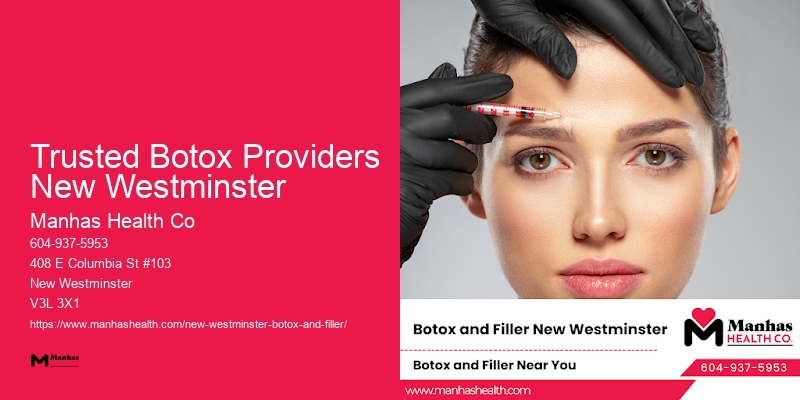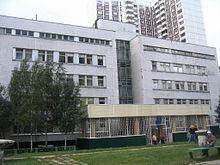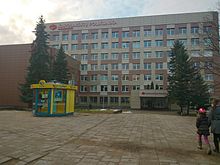

The procedure begins with a thorough consultation at Manhas Health Co., where your skin's condition and desired outcomes are assessed. Learn more about Trusted Botox Providers New Westminster here The pigment in the follicles absorbs the light, which then destroys the hair. For optimal results, a series of sessions, usually once a week for about six to eight weeks, is recommended. No problem.
However, the evidence lies in the visible results. Learn more about Botox Clinic New Westminster here. With fillers, you're not just transforming your appearance; you're boosting your confidence and taking a step towards the best version of yourself. By choosing Morpheus 8, you're opting for a non-surgical way to achieve significant, long-lasting improvements in your skin's appearance.
If you're seeking a way to rejuvenate your appearance, these innovative treatments offer a blend of cutting-edge technology and natural healing processes to restore your youthful glow and revive thinning hair. We'll work closely with you to design a treatment plan that addresses your specific needs, whether it's skin rejuvenation, body contouring, or anti-aging solutions. It's a testament to the power of non-invasive technology to not just change how you look, but how you feel about your body.
It is located on the banks of the Fraser River as it turns southwest towards its estuary, on the southwest side of the Burrard Peninsula, and roughly at the centre of the Greater Vancouver region.
Whether you're looking to reduce fat, tighten skin, or tone muscles, it's all possible with this single platform. Minor swelling or redness around the injection sites can occur but should subside within a few days. Manhas Health Co offers several cutting-edge techniques for vaginal rejuvenation, designed to meet the unique needs of each client. Our team of experts is here to guide you through each treatment option, helping you make informed decisions about your care. You'll not only notice a reduction in hair loss, but also a significant improvement in hair density and thickness.
At Manhas Health Co, we're dedicated to helping you look and feel your best, with a personalized touch every step of the way. Botox and skin hydration New Westminster Book your appointment today at Manhas Health Co., and let's take you on a journey to rediscover your skin's natural beauty and vitality. Book your appointment today and experience the difference our experienced team of specialists can make in your aesthetic journey. For the first few days, you might notice redness or swelling, similar to a sunburn.
That's why we've designed a comprehensive aftercare program tailored to meet your unique needs and ensure the longevity of your results. It's also important to resist the temptation to scratch or pick at your skin, as this can lead to irritation or even scarring. This cutting-edge treatment combines microneedling with radiofrequency energy to target the deeper layers of your skin. It uses concentrated light beams to penetrate hair follicles.
You're probably wondering if these treatments are right for you. It's also used to treat medical skin conditions, offering relief and improvements for issues like rosacea, acne scars, and even minor vascular concerns. And with our team's expertise, you can rest assured that you're in the best hands. You can get back to your daily routine immediately after your session.


Make sure you're hydrated and have eaten a light meal before you arrive. You might experience temporary redness, swelling, or a slight tingling sensation immediately after the treatment. This heat energy encourages the natural production of collagen, the protein responsible for keeping your skin tight and elastic. Imagine not having to deal with the daily hassle of shaving or the pain of waxing.
With minimal downtime, you can return to your daily activities, reveling in the glow of rejuvenated skin. Also, try to avoid wearing makeup to your consultation, especially if you're coming in for facial treatments. First, head over to the Manhas Health Co. website. Botox for beauty enhancement New Westminster
It's a safe, effective way to tackle hair thinning without resorting to surgical options. She's your first point of contact and the one who'll guide you through your journey with us. In the days following your session, you'll likely notice your skin feels tighter and more supple.
We're committed to creating a supportive environment where you feel valued and understood. Infection risk is minimal since the procedure uses your blood, reducing the likelihood of adverse reactions. You're not just another client; you're a unique individual with specific aesthetic goals, and that's exactly how they treat you.
After your procedure, you'll need to follow specific guidelines to ensure a smooth and effective healing process. Book your appointment today and discover the difference at Manhas Health Co. However, like any treatment, there are risks and possible side effects you should be aware of. However, it's not for everyone. They're here to answer all your questions and make sure you're comfortable every step of the way.


Moreover, the precision of radiofrequency means it can be tailored to your specific skin concerns and areas that need attention. Feeling comfortable and at ease enhances your experience and helps us take the best care of you. Our expert team starts with a thorough assessment of your skin type, lifestyle, and skincare goals. Products containing Vitamin C or E can fight free radicals, reducing the risk of damage to your rejuvenated skin. Each treatment is designed with your safety and comfort in mind, ensuring you receive the best care possible.
Witnessing the transformation in your skin before and after Advanced Forma Face Sculpting sessions can be truly remarkable. Before diving into any treatment, we start with a thorough consultation. For instance, Emma, a mother of two, recounts how the procedure not only enhanced her physical comfort but also restored her confidence, making her feel rejuvenated and more connected to her body. Dermaplaning gently scrapes away the top layer of dead skin cells, revealing a smoother and brighter complexion underneath, while chemical peels address a range of issues from fine lines to acne scars by exfoliating the skin at a deeper level.
Our specialists boast years of experience in the latest aesthetic techniques and technologies. Botox consultation New Westminster A visibly refreshed, smoother complexion that's ready to glow. Botox treatment duration New Westminster Firstly, you'll notice an immediate improvement in the appearance of facial lines and wrinkles, giving you a more youthful look. Laser hair removal offers a long-term solution for unwanted hair, directly targeting hair follicles without damaging the surrounding skin.
We understand that everyone's journey to feeling their best is unique, which is why our approach is tailored specifically to meet your individual needs. Our state-of-the-art laser technology is designed to suit various skin types and tones, ensuring personalized care for every client. On the other hand, PRP, or Platelet-Rich Plasma therapy, shines in the domain of hair restoration.
You've likely heard whispers of their state-of-the-art clinic, where advanced laser therapy and anti-aging solutions are more than just promise-they're reality. Lastly, attending follow-up appointments is vital. Based on this analysis, they'll craft a personalized skincare regimen, selecting products and treatments that align perfectly with your skin's characteristics.
Let's embrace and enhance your natural beauty together. At Manhas Health Co., we're not just about making you look good; we're about making you feel your best, using technology that sets new standards in aesthetic care. Instead, switch to gentle cleansers and moisturizers that nourish without irritating.


A clinic (or outpatient clinic or ambulatory care clinic) is a health facility that is primarily focused on the care of outpatients. Clinics can be privately operated or publicly managed and funded. They typically cover the primary care needs of populations in local communities, in contrast to larger hospitals which offer more specialized treatments and admit inpatients for overnight stays.
Most commonly, the English word clinic refers to a general practice, run by one or more general practitioners offering small therapeutic treatments, but it can also mean a specialist clinic. Some clinics retain the name "clinic" even while growing into institutions as large as major hospitals or becoming associated with a hospital or medical school.

The word clinic derives from Ancient Greek κλίνειν klinein meaning to slope, lean or recline. Hence κλίνη klinē is a couch or bed and κλινικός klinikos is a physician who visits his patients in their beds.[1] In Latin, this became clīnicus.[2][3]
An early use of the word clinic was "one who receives baptism on a sick bed".[4]

Clinics are often associated with a general medical practice run by one or several general practitioners. Other types of clinics are run by the type of specialist associated with that type: physical therapy clinics by physiotherapists and psychology clinics by clinical psychologists, and so on for each health profession. (This can even hold true for certain services outside the medical field: for example, legal clinics are run by lawyers.)
Some clinics are operated in-house by employers, government organizations, or hospitals, and some clinical services are outsourced to private corporations which specialize in providing health services. In China, for example, owners of such clinics do not have formal medical education. There were 659,596 village clinics in China in 2011.[5]
Health care in India, China, Russia and Africa is provided to those regions' vast rural areas by mobile health clinics or roadside dispensaries, some of which integrate traditional medicine. In India these traditional clinics provide ayurvedic medicine and unani herbal medical practice. In each of these countries, traditional medicine tends to be a hereditary practice.

The function of clinics differs from country to country. For instance, a local general practice run by a single general practitioner provides primary health care and is usually run as a for-profit business by the owner, whereas a government-run specialist clinic may provide subsidized or specialized[dubious – discuss] health care.
Some clinics serve as a place for people with injuries or illnesses to be seen by a triage nurse or other health worker. In these clinics, the injury or illness may not be serious enough to require a visit to an emergency room (ER), but the person can be transferred to one if needed.
Treatment at these clinics is often less expensive than it would be at a casualty department. Also, unlike an ER these clinics are often not open on a 24/7/365 basis. They sometimes have access to diagnostic equipment such as X-ray machines, especially if the clinic is part of a larger facility. Doctors at such clinics can often refer patients to specialists if the need arises.[6]

Large outpatient clinics vary in size, but can be as large as hospitals.
Typical large outpatient clinics house general medical practitioners (GPs) such as doctors and nurses to provide ambulatory care and some acute care services but lack the major surgical and pre- and post-operative care facilities commonly associated with hospitals.

Besides GPs, if a clinic is a polyclinic, it can house outpatient departments of some medical specialties, such as gynecology, dermatology, ophthalmology, otolaryngology, neurology, pulmonology, cardiology, and endocrinology. In some university cities, polyclinics contain outpatient departments for the entire teaching hospital in one building.

Large outpatient clinics are a common type of healthcare facility in many countries, including France, Germany (long tradition), Switzerland, and most of the countries of Central and Eastern Europe (often using a mixed Soviet-German model), as well as in former Soviet republics such as Russia and Ukraine;[7] and in many countries across Asia and Africa.[8]
In Europe, especially in the Central and Eastern Europe, bigger outpatient health centers, commonly in cities and towns, are called policlinics (derived from the word polis, not from poly-).
Recent[when?] Russian governments have attempted to replace the policlinic model introduced during Soviet times with a more western model. However, this has failed.[9]
In the Czech Republic, many policlinics were privatized or leasehold and decentralized in the post-communist era: some of them are just lessors and coordinators of a healthcare provided by private doctor's offices in the policlinic building.[10]
India has also set up huge numbers of polyclinics for former defense personnel. The network envisages 426 polyclinics in 343 districts of the country which will benefit about 33 lakh (3.3 million) ex-servicemen residing in remote and far-flung areas.[11]
Policlinics are also the backbone of Cuba's primary care system and have been credited with a role in improving that nation's health indicators.[12]


Providing health services through mobile clinics provides accessible healthcare services to these remote areas that have yet to make their way in the politicized space. For example, mobile clinics have proved helpful in dealing with new settlement patterns in Costa Rica. Before foreign aid organizations or the state government became involved in healthcare, Costa Rica's people managed their own health maintenance and protection.[13] People relied on various socio-cultural adaptations and remedies to prevent illnesses, such as personal hygiene and settlement patterns.[13] When new settlements that sprang up along the coast became "artificial" communities, and due to lack of traditional home healing practices here, alternative methods such as mobile clinics had to be implemented in these communities for the protection and prevention of diseases.[13]
A study done in rural Namibia revealed the health changes of orphans, vulnerable children and non-vulnerable children (OVC) visiting a mobile clinic where health facilities are far from the remote villages.[14] Over 6 months, information on immunization status, diagnosis of anemia, skin and intestinal disorders, nutrition, dental disorders was collected and showed that visits to mobile clinics improved the overall health of children that visited regularly. It concluded that specified "planning of these programs in areas with similarly identified barriers may help correct the health disparities among Namibian OVC and could be a first step in improving child morbidity and mortality in difficult-to-reach rural areas."[14]

Food supplementation in the context of routine mobile clinic visits also shows to have improved the nutritional status of children, and it needs further exploration as a way to reduce childhood malnutrition in resource-scarce areas. A cross-sectional study focussed on comparing acute and chronic undernutrition rates prior to and after a food-supplementation program as an adjunct to routine health care for children of migrant workers residing in rural communities in the Dominican Republic.[15] Rates of chronic undernutrition decreased from 33% to 18% after the initiation of the food-supplementation program and shows that the community members attending the mobile clinics are not just passively receiving the information but are incorporating it and helping keep their children nourished.[15]

There are many different types of clinics providing outpatient services. Such clinics may be public (government-funded) or private medical practices.
cite book: |website= ignored (help)
Cosmetic may refer to:
You might experience bruising, swelling, or redness at injection sites. Rarely, you could face infection, allergic reactions, or asymmetry. With Botox, there's a slight risk of drooping eyelids or muscle weakness. Always consult a professional.
To ensure your safety and satisfaction during the COVID-19 pandemic, Manhas Health Co. follows strict hygiene protocols, uses personal protective equipment, and enforces social distancing in its premises, guaranteeing a secure and comfortable experience.
You'll be glad to know that they prioritize your privacy by following strict confidentiality protocols, using secure systems for patient records, and ensuring all staff are trained in data protection to safeguard your information.